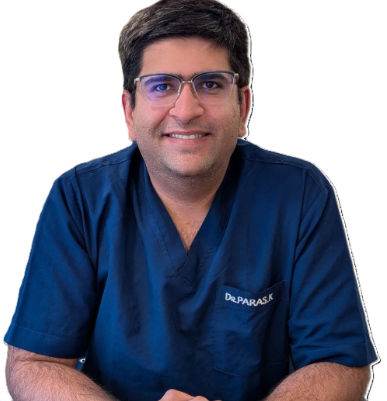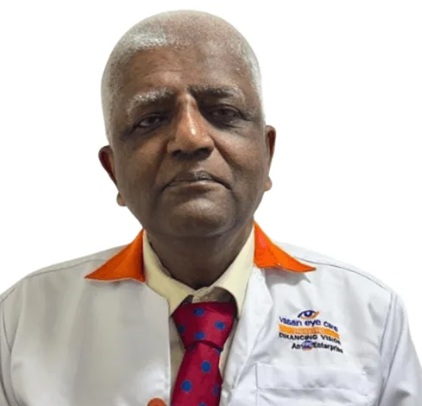Laser Cataract Surgery - Procedure, Types, Recovery Time
Dr. Aman Priya Khanna

Treatment Duration
10 Minutes
------ To ------22 Minutes
Treatment Cost
₹ 42,000
------ To ------₹ 1,50,000

Table of Contents
- What is Laser Cataract Surgery?
- Who Needs Laser Cataract Surgery?
- How is Laser Cataract Surgery Performed?
- What to Expect Before and On the Day of Laser Cataract Surgery?
- What to Expect After Laser Cataract Surgery?
- Benefits of Laser Cataract Surgery
- Risks and Complications of Laser Cataract Surgery
- Risks of Delaying Laser Cataract Surgery
- Cost of Laser Cataract Surgery
- Takeaway
Laser cataract surgery is a groundbreaking procedure that has revolutionised treating cataracts. With its unparalleled precision and efficiency, laser cataract surgery empowers countless individuals to regain their clarity of vision. The procedure has not only elevated the standard of cataract treatment but also significantly reduced the risk of complications.
Say goodbye to blurry vision with laser cataract surgery. Advanced techniques like femtosecond laser cataract surgery use cutting-edge techniques to offer a safer alternative to traditional cataract surgery. Read the following blog to learn everything about laser cataract surgery, from its benefits and risks to procedure and recovery.
Surgery Name | Laser Cataract Surgery |
Alternative Name | Femtosecond laser cataract surgery |
Disease Treated | Cataract |
Benefits of the Surgery | Minimally invasive, Quick recovery, Less pain, Vision Clarity |
Treated by | Ophthalmologist |
You can check Laser Cataract Surgery Cost here.
What is Laser Cataract Surgery?
Laser cataract surgery, or Femto Laser-Assisted Cataract Surgery (FLACS), is a modern and advanced technique that removes cataracts from the eye.
During traditional cataract surgery, a surgeon uses a small ultrasonic instrument to break up and remove the cloudy lens. They replace the cloudy lens with an artificial intraocular lens (IOL).
In laser cataract surgery, a femtosecond laser performs certain key steps of the procedure. This bladeless laser cataract surgery makes it easier for the surgeon to remove the cloudy lens and insert the IOL with greater predictability and control. It is an extremely safe procedure with a high success rate.
Anatomy and Physiology of the Eye Lens
The eye lens is a transparent, biconvex-shaped (convex on both sides) structure located behind the iris (coloured part of the eye). It plays a crucial role in focusing light onto the retina, essential for clear vision.
When light enters an individual’s eye, it first passes through the cornea. Next, the lens refracts (bends) the light to ensure it converges precisely onto the retina.
The lens of the eye is composed of three main layers:
Lens Capsule: It is a thin, elastic, and transparent membrane that encloses the entire lens.
Lens Epithelium: Beneath the capsule, the lens epithelium maintains the stable function of the lens. They also create lens fibre for lens growth throughout a person’s life.
Lens Fibre: They are elongated, transparent cells that form the bulk of the lens.
Laser Cataract Surgery Videos by HexaHealth
Expert Doctors (10)
NABH Accredited Hospitals (10)


Who Needs Laser Cataract Surgery?
Ideal candidates for laser cataract surgery include individuals diagnosed with cataracts causing visual impairment and affecting their daily activities.
Most people with cataracts can benefit from laser cataract surgery. Some requirements for the procedure include:
General good eye health
Stable vision for the last year
A stable eyeglass/contact lens prescription for at least a couple of years
No previous eye disease, such as corneal ulcers
No other current eye diseases, like glaucoma, dry eyes, diabetic retinopathy, etc.
Conditions Treated With Laser Cataract Surgery
Laser cataract surgery is primarily used to treat cataracts. It is a condition characterised by the clouding of the eye’s natural lens. The eye lens is generally clear and helps focus light onto the retina, which transmits visual signals to the brain.
On the other hand, a cataract causes the lens to become clouded, resulting in blurry or foggy vision.
Cataracts generally develop slowly over time and can affect one or both eyes. As the cataract progresses, it may cause symptoms such as:
Difficulty seeing at night
Sensitivity to glare
Double vision in a single eye
Reduced colour perception
Frequent changes in eyeglass prescription
Cataract surgery is a standard and effective treatment to replace the clouded eye lens with an artificial intraocular lens. This helps restore clear vision.
How is Laser Cataract Surgery Performed?
Laser eye surgery for cataracts is generally quick and usually completed in less than 30 minutes. Patients may expect little to no discomfort during the procedure.
The femto laser cataract surgery typically follows these steps:
Patient Position: The patient will be made to lie on their back on the operating table.
IV Line Administration: An IV line will be inserted in their hands or arms for medicine.
Anaesthesia: The patient will be awake during the surgery. However, local anaesthesia will be administered to numb the eye, ensuring the patient’s comfort during the procedure.
Dilation: The eyes of the patients will be dilated using eye drops. This helps the surgeon to examine all parts of the eye.
Imaging: The surgeon will use an imaging test called Optical Coherence Tomography (OCT) to create a 3D image of the eye. This will help measure the length, breadth, and location of the cataract.
Corneal Incision: With the help of an OCT image and femtosecond laser, the surgeon will make a small incision in the patient’s cornea to access the lens.
Capsulotomy: The surgeon will use a femtosecond laser to make a precise circular opening in the lens capsule.
Lens and Cataract Fragmentation: The laser will soften and break the cataract into smaller pieces, making it easier to remove.
Phacoemulsification: An ultrasonic probe will be inserted through the corneal incision to remove the fragmented cataract from the eye.
IOL Implantation: The surgeon will insert the artificial intraocular lens (IOL) into the lens capsule to replace the cloudy natural lens.
Patients can watch laser cataract surgery videos online to understand the procedure better.
What to Expect Before and On the Day of Laser Cataract Surgery?
Like any other procedure, laser cataract surgery may require certain preparations beforehand. The doctor will provide certain instructions to be followed before and on the day of the surgery.
Before Laser Cataract Surgery
Before undergoing laser cataract surgery, thorough pre-operative assessments and evaluations are conducted to determine the severity of the cataract and assess overall eye health.
It helps ensure that femtosecond laser cataract surgery is the most appropriate treatment plan for the patient.
Medications: Patients should inform the doctor about their ongoing medications, including prescription, over-the-counter, herbs, and supplements.
Fasting: They may or may not need to fast before the procedure. The healthcare team will provide instructions regarding diet restrictions.
Restrictions: The doctor will advise the patient to stop wearing contact lenses or rubbing their eyes at least a week before the procedure.
Discussion: The surgeon will discuss the procedure with the patient, explaining the benefits, potential risks, and expected outcomes. Additionally, the best-suited intraocular lens (IOL) type will be determined and discussed.
Transportation: Patients should arrange for suitable transport, as they cannot drive themselves home after the procedure.
On the Day of Laser Cataract Surgery
Patients will arrive at the surgical facility on the surgery day and complete any necessary registration or paperwork. They can expect the following on the day of the surgery:
Patients should wear something comfortable to their surgery and have their hair pinned away from the eyes.
All eye makeup should be removed at least 24 hours before the surgery.
Patients should not apply cream or makeup on their faces or eyes on the day of the procedure.
In the hospital, the anaesthesiologist will monitor the patient’s vital signs, such as breathing, blood pressure, etc.
The medical team will shift the patient to the OT room.
What to Expect After Laser Cataract Surgery?
Laser cataract surgery recovery time can take a few weeks. Patients must follow the post-operative instructions during this time to ensure faster recovery without complications. The following is what patients can expect during recovery:
The Recovery Process in the Hospital
After the surgery, patients will have dark protective glasses placed on their eyes. They will be moved to a recovery room. In the recovery room, patients can expect the following:
A nurse or doctor will check the vital signs, including temperature, blood pressure, breathing, and pulse.
Patients may experience itchy, gritty, burning, or watery eyes.
Vision may be blurry immediately after surgery.
The patient will get discharged once their condition stabilises and have no indications of complications (pain, swelling, bleeding).
Recovery Process/Expectations After Hospital Discharge
When the patient gets discharged, the doctor provides several home-care instructions for a smooth recovery. The do’s and don’ts for recovery at home include:
Do’s
Use the eye drops as instructed by the surgeon to prevent infection and promote healing.
Use the eye shield or protective eyewear provided by the surgeon while sleeping or during the day. It helps protect the operated eye from accidental rubbing or trauma.
Wear sunglasses to protect the eyes from sunlight and bright light during the first few days after surgery.
Take prescribed medications to help manage pain.
Eat a nutritious diet to promote healing.
Don’ts
Do not rub or put pressure on the operated eye.
Refrain from strenuous activities, heavy lifting, or activities that may strain the eyes during the early recovery period.
Do not drive on the day of surgery until the surgeon approves.
Avoid getting water or soap in the eyes during the initial recovery period.
Avoid swimming, hot tubs, and exposing the eyes to irritants like dust or smoke.
Do not sleep in a position that puts excessive strength on the operated eye.
Refrain from using lotions, creams, and makeup around the eye for at least two weeks after surgery.
First Follow-Up Appointment
The first follow-up appointment after femtosecond laser cataract surgery will take place within 24 to 48 hours after surgery.
The surgeon will evaluate the patient’s healing progress and check the status of the operated eye.
The patient can discuss any discomfort, visual changes, or concerns they may have.
Depending on the healing progress, the surgeon may adjust the prescribed eye drops or medications if necessary.
The surgeon will schedule additional follow-up appointments to continue monitoring the eye’s progress over the coming weeks and months.
Benefits of Laser Cataract Surgery
Laser cataract surgery has revolutionised the field of cataract surgery. It offers several benefits compared to traditional cataract surgery. Some of the key advantages include:
Increased Precision: Using a femtosecond laser allows for accurate incisions, enhancing surgical outcomes.
It allows for a more precise circular incision in the lens above the cataract.
Blade-Free: Traditional cataract surgery involves using needles, blades, and handheld instruments to make the incision.
On the other hand, laser cataract surgery utilises a laser to fragment the cataract and create a small incision without a blade.
Reduced Recovery Time: Laser cataract surgery can use lower energy levels during the procedure than ultrasound in traditional surgery.
This results in less swelling and a quick recovery.
Astigmatism Correction: Unlike traditional surgery, which only corrects cataracts, laser cataract surgery can also correct pre-existing astigmatism (cornea or lens has a different shape than normal).
Less Dependence on Glasses: For some patients, laser cataract surgery combined with premium IOLs may reduce their dependence on glasses for vision issues.
Risks and Complications of Laser Cataract Surgery
Laser cataract surgery is considered safe and effective for the majority of patients. However, it does carry some risks and potential complications, like any surgical procedure.
Some of the risks of laser cataract surgery include:
Itching: Individuals may experience itching or mild irritation in the eye after laser cataract surgery as part of the normal healing process.
The eye may feel scratchy or irritated due to the presence of sutures, eye drops, or the effects of the laser and surgical procedure.
Mild Discomfort: Some people may experience a little discomfort or a sensation of a foreign body in the eye after laser cataract surgery. This discomfort is usually temporary.
Swelling Inside the Eye: It is common to experience slight swelling inside the eye after laser cataract surgery.
The cornea may temporarily swell due to the surgical procedure and insertion of the intraocular lens (IOL). This swelling can cause transient blurring or haziness in the vision.
Dry eyes: Laser cataract surgery can cause temporary dry eyes as a common side effect. This happens when the eyes produce fewer tears.
Glare and Halos: Sometimes, patients may experience glare, halos, or visual disturbances, especially in low-light conditions.
When to Consult a Doctor?
Although rare, sometimes, people may experience severe complications after laser cataract surgery. They should call their healthcare provider immediately if they experience any of the following:
Severe pain that does not get better with medicine
Swelling of the eyelid
Vision loss
Flashes of light or dots in the vision
Increased eye redness
Persistent discomfort
Risks of Delaying Laser Cataract Surgery
Cataract is the leading cause of blindness. Delaying laser cataract surgery may lead to risks and potential consequences for the patient’s vision and overall eye health. These risks may include:
Worsening of Cataracts: Delaying surgery can gradually worsen vision since cataracts are progressive.
Difficulty With Day-to-Day Activities: As the cataract progresses, it can increase difficulty with activities like reading, watching TV, or using digital devices.
Visual Impairment: Delaying laser cataract surgery can cause increasing visual impairment, like poor night vision. This may make nighttime driving challenging.
Increased Complications: Sometimes, delaying surgery can result in a more challenging operation due to denser cataracts. It potentially increases the risk of surgical complications.
Prolonged Recovery: Advanced cataracts can increase the recovery time after surgery.
Cost of Laser Cataract Surgery
Laser cataract surgery cost can vary depending on several factors. On average, the cost of laser cataract surgery in India can range from ₹ 35,000 to ₹ 95,000 per eye.
The cost of laser cataract surgery can be influenced by various factors, including:
City or Location: The cost of living and healthcare expenses in the specific city or region where the surgery occurs can impact the overall cost.
Hospital Type: The type of hospital, its amenities, and the quality of care provided can influence the cost.
Preoperative Evaluation: Additional diagnostic tests or evaluations may incur additional expenses.
Type of Surgery: Different types of cataract surgery laser technologies may have varying costs.
Type of Intraocular Lens (IOL): The cost of the IOL can affect the surgery’s overall cost. Types of lenses may include basic mono-focal lenses or premium multifocal or toric lenses.
Experience of the Surgeon: Highly experienced and renowned surgeons may charge higher fees.
Procedure Cost | Cost Value |
Laser Cataract Surgery (per eye) | ₹ 35,000 to ₹ 95,000 |
Takeaway
Laser cataract surgery represents a significant advancement in treating cataracts, offering improved outcomes for patients. With its ability to create precise incisions, this modern technique has become a safer and more effective option for cataract removal.
Embracing the benefits of laser cataract surgery ensures a brighter future for those seeking visual freedom and optimal eye health.
HexaHealth revolutionises femtosecond laser cataract surgery with cutting-edge technology and a team of skilled ophthalmologists. You can experience increased precision and faster recovery times with state-of-the-art femtosecond lasers. Trust in HexaHealth’s expertise to bring clarity back into your life as we pave the way for unparalleled visual outcomes and compassionate patient care.
Suggested Reads
Frequently Asked Questions (FAQ)
What is laser cataract surgery?
Laser cataract surgery is an advanced technique that uses a femtosecond laser for cataract removal. The laser creates precise incisions, softens the cataract, and breaks it up for easier removal. This results in better visual outcomes.
How does laser cataract surgery work?
Laser cataract surgery uses a femtosecond laser to make precise incisions in the cornea and lens capsule. The laser softens and breaks up the cataract, allowing for easier removal. An artificial IOL is implanted once the cataract is removed.
Laser cataract surgery corrects which type of vision problems?
Laser cataract surgery replaces the clouded lens with an artificial lens, restoring clear vision. It helps correct vision problems caused by cataracts, such as:
Astigmatism (an imperfection in the curvature of the eye’s cornea or lens)
Blurry or hazy vision
Glare sensitivity
Trouble seeing in bright light
What are the advantages of bladeless laser cataract surgery?
Bladeless laser cataract surgery offers advantages such as:
Increased precision
Minimal risk of complications
Enhanced predictability in cataract removal
Reduced energy usage
Potential for faster healing and visual recovery compared to traditional manual methods using blades
What are the different types of laser cataract surgery?
Femtosecond laser cataract surgery is the most common laser cataract surgery.
Is femtosecond laser cataract surgery the same as PRK?
No, femtosecond laser cataract surgery and photorefractive keratectomy (PRK) are different procedures.
Femtosecond laser cataract surgery is used for cataract removal.
PRK is a refractive surgery to correct vision problems like nearsightedness, farsightedness, and astigmatism.
Are there any videos available that demonstrate laser cataract surgery?
Yes, there are laser cataract surgery videos available online. These videos typically showcase the various steps of the procedure, including the use of the laser for corneal incisions, lens fragmentation, and capsulotomy.
This helps patients get educational insights into the surgery.
What are the benefits of laser cataract surgery compared to traditional techniques?
The benefits of laser cataract surgery over traditional techniques include:
Increased precision
Minimal risk of complications
Reduced energy usage
The potential for faster recovery
The ability to correct astigmatism during surgery
Is laser cataract surgery suitable for everyone with cataracts?
Laser cataract surgery is a safe and effective option for many cataract patients, but it may not be suitable for everyone. Patients who are suitable for the procedure include those with:
Good eye health
Stable vision for the past year
A stable eyeglass prescription for at least two years
No past eye diseases like corneal ulcers
No other current eye diseases like glaucoma
Are there any specific pre-operative instructions for laser cataract surgery?
Yes, there are certain pre-operative instructions for laser cataract surgery. These may include:
Stopping certain medications
Using prescribed eye drops as directed
Avoiding contact lenses for at least a week before the surgery
Patients should follow their surgeon’s guidelines for a successful procedure.
How is laser cataract surgery performed?
The following steps are included in laser cataract surgery:
The patient is positioned on the surgical bed.
Eye drops are administered to dilate the pupil and numb the eye.
A laser creates precise incisions in the cornea and lens capsule.
The cataract is softened and fragmented using the laser.
The surgeon removes the cloudy lens and inserts an intraocular lens (IOL).
How long does the laser cataract surgery procedure usually take?
Laser cataract surgery typically takes less than 30 minutes per eye. The exact duration may depend on the complexity of the cataract. The duration can also vary if additional procedures, such as correcting astigmatism, are performed.
What is the typical recovery time after laser cataract surgery?
Laser cataract surgery recovery time is generally quick. Most patients resume normal daily activities within a few days. However, complete healing and vision stabilisation may take several weeks.
Does laser cataract surgery heal faster?
Yes, laser cataract surgery may offer faster healing compared to traditional cataract surgery. This happens due to the increased precision and accuracy of the laser. However, individual healing rates can vary.
What is the fastest way to recover from laser cataract surgery?
The fastest way to recover from laser cataract surgery includes:
Maintaining good eye health
Following post-operative instructions
Using prescribed eye drops as directed
Avoiding strenuous activities
Protecting the eyes from irritants
Attending all follow-up appointments
How long is vision blurry after laser surgery?
The duration of blurry vision after laser cataract surgery varies among individuals. Blurriness after surgery is common. It typically improves within a few days to a couple of weeks as the eye heals and vision stabilises.
Will I need to wear glasses after laser cataract surgery?
The need for glasses after laser cataract surgery depends on various factors, including the type of intraocular lens (IOL) used and the individual’s visual requirements.
While some patients may be able to minimise their dependence on glasses, others may still need them for particular tasks.
What is the success rate of laser cataract surgery?
The success rate of laser cataract surgery is generally high (98% or higher). Most patients experience improved vision and minimal complications.
However, individual outcomes may vary depending on various factors and the surgeon’s expertise.
How soon can I resume normal activities after laser cataract surgery?
Most patients can resume normal activities a day or two after laser cataract surgery. However, one must follow the surgeon’s post-operative instructions for a smooth recovery.
What are the expected outcomes and improvements in vision after laser cataract surgery?
The expected outcomes and improvements in vision after laser cataract surgery include:
Clearer vision
Reduced dependence on glasses
Improved colour perception
Decreased glare and halos
What are the potential risks and complications associated with laser cataract surgery?
Potential risks and complications of laser cataract surgery include:
Itching
Mild Discomfort
Swelling Inside the Eye
Dry eyes
Glare and Halos
How is SMILE different from Femto laser cataract surgery?
SMILE (Small Incision Lenticule Extraction) and Femto laser cataract surgery are different procedures.
SMILE is a refractive surgery to correct myopia and astigmatism.
Femto laser cataract surgery is for cataract removal and lens replacement.
What are the myths versus facts about laser cataract surgery?
Myth: Laser cataract surgery is painful.
Fact: Not true! Surgeons use anaesthesia and modern surgical techniques to perform the surgery. This typically makes the procedure painless.
Myth: Laser cataract surgery completely eliminates the need for glasses.
Fact: Certain lenses used in femtosecond laser cataract surgery can reduce the dependence on glasses. However, some people with a high prescription may still require glasses or contacts.
Laser Cataract Surgery Cost Videos
References
All the articles on HexaHealth are supported by verified medically-recognized sources such as; peer-reviewed academic research papers, research institutions, and medical journals. Our medical reviewers also check references of the articles to prioritize accuracy and relevance. Refer to our detailed editorial policy for more information.
- Healthline Editorial Team. Lens [Internet]. Healthline. Healthline Media; 2015.

- Hollingsworth H. What to Know About Laser Cataract Surgery [Internet]. WebMD.

- Mayo Clinic. Cataracts - Symptoms and causes [Internet]. Mayo Clinic. 2021.

- Russell DM. Is everyone suitable for laser cataract surgery? [Internet]. OKKO Eye Specialist Centre. 2021 [cited 2023 Jul 31].

- What Should I Do to Prepare For Laser Eye Surgery? [VIDEO] [Internet]. www.londonvisionclinic.com. 2022 [cited 2023 Jul 31].

- A Complete Guide on Laser Cataracts Surgery: Meaning, Benefits, & Treatment [Internet]. Centre For Sight. [cited 2023 Jul 31].

- Laser eye surgery: Benefits, risks, and what to expect [Internet]. www.medicalnewstoday.com. 2021.

- What Are The Drawbacks Of Delaying Cataract Surgery? Contact The Best Eye Specialist In Mumbai At Ojas Eye Hospital [Internet]. [cited 2023 Jul 31].

Last Updated on: 4 July 2024
Reviewer

Dr. Aman Priya Khanna
MBBS, DNB General Surgery, FMAS, FIAGES, FALS Bariatric, MNAMS General Surgery
13 Years Experience
Dr Aman Priya Khanna is a highly experienced and National Board–Certified Laparoscopic, GI, and Bariatric Surgeon with over 13 years of clinical expertise.
He is widely regarded as one of the best bariatric surgeons in Ahmedabad, ...View More
Author

Charu Shrivastava
BSc. Biotechnology I MDU and MSc in Medical Biochemistry (HIMSR, Jamia Hamdard)
3 Years Experience
Skilled in brand marketing and SEO-driven medical content that educates and engages patients, healthcare professionals, and the general public. With medical writing and proofreading expertise, she ensures accuracy,...View More
Laser Cataract Surgery in Top Cities
Laser Cataract Surgery Cost in Top Cities

























